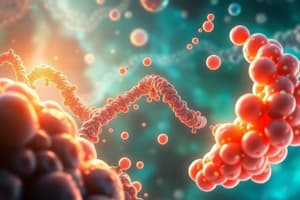Podcast
Questions and Answers
What is the most abundant substance in living systems?
What is the most abundant substance in living systems?
- Protein
- Lipid
- Carbohydrate
- Water (correct)
What is the geometry of a water molecule?
What is the geometry of a water molecule?
- Linear
- Tetrahedral (correct)
- Triangular
- Octahedral
What type of bond is a hydrogen bond?
What type of bond is a hydrogen bond?
- Nonpolar covalent bond
- Covalent bond (correct)
- Polar covalent bond
- Ionic bond
What property of water allows it to have a high heat capacity?
What property of water allows it to have a high heat capacity?
What is the function of water as a universal solvent?
What is the function of water as a universal solvent?
What is the consequence of hydrogen bonds being strongest when the bonded molecules are oriented to maximize electrostatic interaction?
What is the consequence of hydrogen bonds being strongest when the bonded molecules are oriented to maximize electrostatic interaction?
At what temperature does water have its highest density?
At what temperature does water have its highest density?
What property of water contributes to its high cohesive and adhesive properties?
What property of water contributes to its high cohesive and adhesive properties?
What is the electric charge carried by the oxygen atom in a water molecule?
What is the electric charge carried by the oxygen atom in a water molecule?
What does the course of evolution has been shaped by?
What does the course of evolution has been shaped by?
What determines the ability of water to dissolve substances?
What determines the ability of water to dissolve substances?
Which type of compounds dissolve easily in water?
Which type of compounds dissolve easily in water?
What is the term for molecules or groups that are insoluble in water?
What is the term for molecules or groups that are insoluble in water?
What is the function of aldosterone and antidiuretic hormone in body fluid homeostasis?
What is the function of aldosterone and antidiuretic hormone in body fluid homeostasis?
Where is the interstitial fluid found?
Where is the interstitial fluid found?
What is osmosis?
What is osmosis?
What is osmotic pressure?
What is osmotic pressure?
What is the molecular mobility related to osmotic effect?
What is the molecular mobility related to osmotic effect?
What are isotonic solutions?
What are isotonic solutions?
What are hypertonic solutions?
What are hypertonic solutions?
What are hypotonic solutions?
What are hypotonic solutions?
Flashcards are hidden until you start studying
Study Notes
Water in Living Systems
- Water is the most abundant substance in living systems.
Structure of Water Molecules
- The geometry of a water molecule is bent or V-shaped.
- A water molecule (H2O) has a slightly positive charge on the hydrogen atoms and a slightly negative charge on the oxygen atom.
- The oxygen atom in a water molecule carries a partial negative charge (δ-).
Hydrogen Bonds
- Hydrogen bonds are a type of weak electrostatic attraction between molecules.
- Hydrogen bonds are strongest when the bonded molecules are oriented to maximize electrostatic interaction.
- Hydrogen bonds are responsible for water's high heat capacity and its ability to dissolve substances.
Properties of Water
- Water has a high heat capacity due to the energy required to break hydrogen bonds.
- Water has high cohesive and adhesive properties due to the strong hydrogen bonds between molecules.
- Water's high surface tension and viscosity are also due to hydrogen bonds.
Water as a Solvent
- Water is a universal solvent, able to dissolve a wide variety of substances.
- Substances that dissolve easily in water are called hydrophilic (water-loving) compounds, such as salts, sugars, and amino acids.
- Substances that are insoluble in water are called hydrophobic (water-fearing) compounds, such as oils and fats.
- The ability of water to dissolve substances is determined by its polarity and hydrogen bonding ability.
Regulation of Body Fluids
- Aldosterone and antidiuretic hormone (ADH) regulate body fluid homeostasis.
- Aldosterone helps regulate the amount of water reabsorbed in the kidneys.
- ADH helps regulate the amount of water reabsorbed in the kidneys and the permeability of the collecting ducts.
Fluid Balance and Osmosis
- Interstitial fluid is found in the spaces between cells.
- Osmosis is the movement of water molecules from a region of high concentration to a region of low concentration through a selectively permeable membrane.
- Osmotic pressure is the pressure required to prevent osmosis.
- Molecular mobility is related to the osmotic effect, as it affects the rate of water movement.
- Isotonic solutions have the same osmotic pressure as the cell's internal environment.
- Hypertonic solutions have a higher osmotic pressure than the cell's internal environment, causing water to leave the cell.
- Hypotonic solutions have a lower osmotic pressure than the cell's internal environment, causing water to enter the cell.
Studying That Suits You
Use AI to generate personalized quizzes and flashcards to suit your learning preferences.




